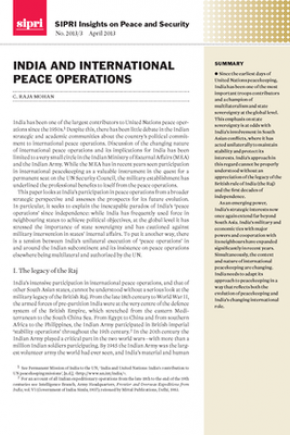India and International Peace Operations
Since the earliest days of United Nations peacekeeping, India has been one of the most important troops contributors and a champion of multilateralism and state sovereignty at the global level. This emphasis on state sovereignty is at odds with India’s involvement in South Asian conflicts, where it has acted unilaterally to maintain stability and protect its interests. This apparent disconnect cannot be properly understood without an appreciation of the legacy of the British rule of India (the Raj) and the first decades of independence.
As an emerging power, India’s strategic interests now once again extend far beyond South Asia. India’s military and economic ties with major powers and cooperation with its neighbours have expanded significantly in recent years. Simultaneously, the context and nature of international peacekeeping are changing. This SIPRI Insights paper examines India’s involvement in international peace operations to date and the new realities that are likely to shape India’s approach in the coming years.
I. The legacy of the Raj
II. The military surplus
III. The cold war and beyond
IV. Rising India, changing role
V. Conclusions

